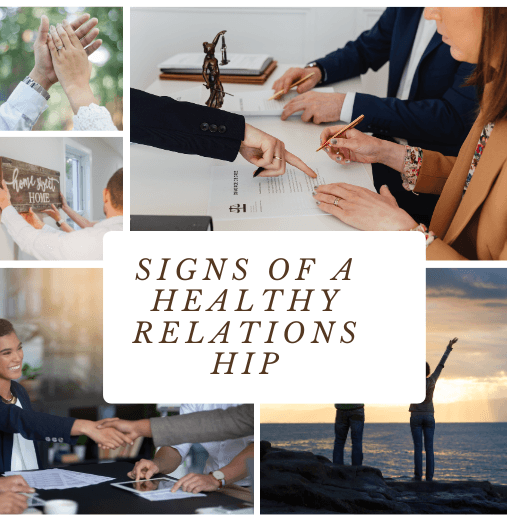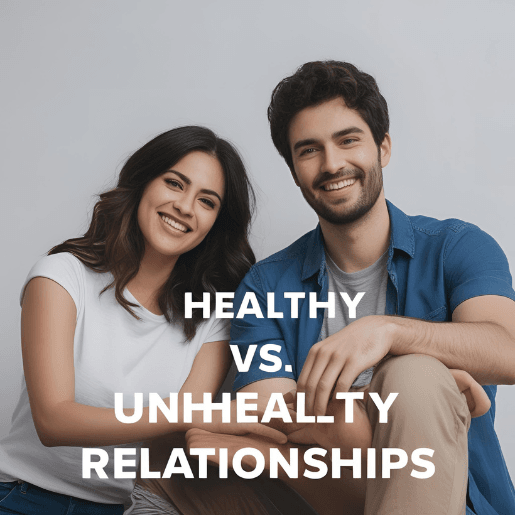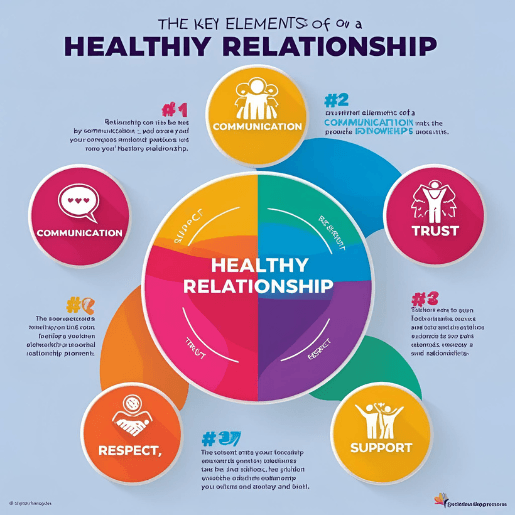In a world full of relationship advice, it’s easy to get overwhelmed by what love “should” look like. But at its core, a healthy relationship is built on mutual respect, trust, and a genuine desire to see each other grow. Whether you’re dating, married, or somewhere in between, understanding the signs of a healthy relationship can help you cultivate a deeper connection and emotional safety.
What Is a Healthy Relationship?
A healthy relationship is one where both people feel valued, heard, and supported. It doesn’t mean you’ll never argue or disagree. Instead, it means you’ll navigate those conflicts in a respectful, productive way. In a healthy relationship, both individuals maintain their identity while also nurturing the partnership.
Key Signs of a Healthy Relationship

In every relationship, there are silent signals—little cues that tell you things are safe, supportive, and real. These aren’t always grand gestures or movie-moment confessions. Signs can be as simple as your partner listening to you after a long day or how you both handle tough talks without hurting each other. Let’s dive deeper into what truly makes up the signs of a healthy relationship, broken down not just as a checklist but as an experience you can feel every day.
1. Open and Honest Communication
In a healthy relationship, communication feels like a safe and comforting space. You can share your thoughts and feelings openly, knowing that you won’t be judged or dismissed. Misunderstandings can be considered chances to learn and develop, rather than reasons to lash out or pull away. It’s possible to have different opinions without any animosity, and both partners truly want to understand each other’s needs. Conversations flow between you, creating a space where even the quiet moments feel warm and reassuring, rather than strained.
2. Mutual Respect
Respect is what binds everything else in harmony. You appreciate the unique qualities in one another and respect each other’s time, space, and individuality. Even in heated moments, you steer clear of putting others down, using sarcasm, or keeping track of points. Instead, there’s a mutual understanding to uphold each other’s dignity. You support one another, lifting each other instead of bringing each other down. Each partner appreciates the other for their true selves, beyond just their actions.
3. Trust and Transparency
In a healthy relationship, trust isn’t something you just ask for; it’s built over time through consistent actions and genuine care. You feel a comforting sense of emotional safety and physical security. It’s all about honest discussions and finding common ground, without any games or hidden agendas. When you trust someone, you can relax when apart and share your thoughts when together. When someone shows vulnerability, it should be met with understanding rather than taking advantage, and openness should come easily, not as a result of being forced.
4. Healthy Boundaries
Boundaries create balance, not distance. You can say “no” without guilt and ask for space without triggering the alarm. Healthy boundaries in relationships make room for both connection and independence. You respect each other’s digital privacy, emotional thresholds, and social circles. These invisible lines aren’t barriers—they’re guides that help you thrive as individuals within a supportive union.
5. Emotional Support
True love isn’t just about being there—it’s about showing up in the right way. You know you can fall apart without being left behind. Your partner notices your subtle shifts in mood and checks in without being asked. Joys are celebrated as mutual victories, and hardships are shouldered together. There’s no pressure to be “on” all the time—just the comfort of knowing you’re not alone.
6. Shared Responsibility
Healthy couples engage in a balanced and fair way in the beautiful game of love. You share the invisible load of emotional labor, chores, finances, and life planning. Both partners contribute equally to the relationship, and the exchange of apologies is reciprocal. Instead of tracking favors with a silent scoreboard, you share responsibility because you both care deeply. Whether it’s handling bills or supporting career goals, there’s a sense of balance that feels right.
7. Growth and Encouragement
Healthy relationships are growth zones. You feel free to chase dreams, explore new parts of yourself, and evolve without fear of being left behind. Your partner supports your growth, not just the version of you they first met. Feedback is given with love, not shame. They celebrate your success and respond to your setbacks with encouragement rather than criticism. Together, you nurture a relationship that allows both people to become the best version of themselves.
8. Reliability and Emotional Consistency
In healthy relationships, consistency creates safety. You know you can count on each other, not just in emergencies, but in everyday routines—like remembering important dates or simply being present at the end of a long day. Emotional consistency means your partner doesn’t change their tone or attitude based on their mood. You don’t feel like you have to tiptoe around them or second-guess what you’ll get today. When both partners can rely on each other emotionally, it creates a grounded, steady environment that allows trust to deepen naturally over time.
9. Emotional Availability and Validation
A relationship can’t thrive if one or both people are emotionally absent. In healthy dynamics, your feelings are not only accepted but also validated. You’re encouraged to express what’s going on internally without being judged, mocked, or shut down. Whether you’re celebrating a win or working through a tough day, your emotions are considered valuable, not inconvenient. Emotional availability means showing up fully, even during the uncomfortable conversations. When validation is mutual, it breeds empathy and understanding—core ingredients for intimacy.
10. Shared Values and Vision for the Future
While opposites can attract, shared values sustain. Healthy relationships are anchored in similar views about life’s bigger questions, such as how you view finances, family, careers, or spirituality. Having these common values can reduce potential conflicts and make decision-making clearer. It doesn’t mean you have to agree on everything, but it does mean your core beliefs align enough to foster unity. A mutual vision for the future—whether it’s buying a home, traveling, or building a family—acts as the glue that keeps you moving forward together.
11. Pace to Be Yourself
Healthy love doesn’t smother—it celebrates individuality. In a strong relationship, both partners feel free to pursue their passions, interests, and friendships without fear of jealousy or punishment. No one expects you to shrink or change who you are to receive love. Instead, your uniqueness is part of the attraction. This balance between closeness and independence creates room to breathe and grow, both as a couple and as individuals.
12. Humor and Playfulness
One of the often-overlooked signs of a healthy relationship is shared laughter. Humor softens the edges of stress and makes daily life more enjoyable. Being able to laugh at yourselves, share inside jokes, or just be silly together adds levity to the partnership. Playfulness acts as emotional glue, helping you bond through lightness and joy. It reminds you that while life can be serious, your connection doesn’t always have to be.
Healthy vs. Unhealthy Relationships

1. Understanding the Core Difference
Every relationship offers valuable lessons, yet not all are beneficial. Understanding this distinction can truly transform our lives. A strong relationship thrives on trust, respect for one another, a sense of shared responsibility, and the emotional support we give each other. It helps everyone involved feel secure, appreciated, and capable. Conversely, a toxic relationship can subtly chip away at your happiness or be outright damaging. It can include aspects like control, manipulation, emotional neglect, or codependency. It can be tough because unhealthy behaviors sometimes wear a mask of care or love, particularly when someone feels a strong bond or fears losing that connection. Observing the warning signs is a crucial first step toward healing and building stronger, healthier relationships.
2. Communication and Emotional Safety
In a healthy relationship, communication flows freely and respectfully. Both partners listen without interrupting, express themselves honestly, and resolve conflicts constructively. There’s a natural rhythm of giving and receiving—support feels mutual, and neither person feels like they are constantly sacrificing their well-being. Healthy relationships foster independence while also nurturing connection. Each partner can grow individually and together. Unhealthy relationships, however, are marked by breakdowns in communication, where silence, passive-aggression, or blame replace dialogue. One person may dominate the decision-making, dismiss the other’s needs, or use guilt as a form of control. Over time, these patterns can chip away at self-esteem, leading to anxiety, confusion, and emotional exhaustion.
3. Emotional Health and Power Dynamics
A common misconception is that only physically abusive relationships are unhealthy, but emotional damage can be equally destructive. If your boundaries are constantly crossed, your voice silenced, or your feelings invalidated, you’re likely in an unhealthy dynamic. Trust your intuition—if something feels off consistently, it probably is. In healthy relationships, you should never feel compelled to hide or minimize your true self to maintain harmony. They welcome your true self, respect your openness, and encourage your development. On the flip side, unhealthy relationships often revolve around power dynamics, dependency, and fear. These factors cause an imbalance in which one person gives more than they get, often harming their mental health.
4. Conflict Resolution and Recovery
One of the clearest signs of a healthy relationship is the ability to grow through challenges without blame. Arguments happen, but they don’t leave wounds. Instead, both partners come away with a more profound understanding and greater emotional maturity. In an unhealthy relationship, arguments often escalate into personal attacks, defensiveness, or cold withdrawal. Rather than resolving issues, conflict becomes a cycle that drains the relationship of trust and connection. If you consistently avoid conflict, worry about your partner’s reactions, or rationalize actions that diminish you, it’s time for a reevaluation. A healthy relationship feels like a partnership; an unhealthy one often feels like a performance.
Related Topic- How Human Relationships Reshape Our Neural Pathways
What Makes a Relationship Healthy?

A strong relationship isn’t about being flawless; it’s about being there for each other, showing patience, and working together as a team. True connection doesn’t require flawlessness; it requires two people willing to show up with honesty, empathy, and consistency. Instead of striving to avoid mistakes, partners in a healthy relationship learn to grow through them. Disagreements transform into opportunities for deeper understanding, and challenges transform into shared experiences instead of contests to win or lose. It’s a dynamic, evolving process that centers on emotional safety, trust, and mutual respect.
1. Emotional Safety is the Foundation
Feeling emotionally safe is essential for nurturing any healthy relationship. It’s the assurance that you can be your authentic self, flaws, fears, and all, without fear of rejection or ridicule. Emotional safety creates the space for vulnerability, which is essential for intimacy. When you feel safe emotionally, communication flows more freely, misunderstandings are resolved more gently, and trust is built naturally over time.
2. Communication That Builds Instead of Breaks
Open, honest communication is the lifeblood of a healthy relationship. It’s not just about talking—it’s about how you talk. Do you feel heard? Are your feelings validated? Do we approach disagreements with an open mind rather than disdain? Effective communication isn’t about always agreeing; it’s about being willing to hear and understand each other, even when you see things differently. This kind of connection fosters deeper emotional intimacy.
3. Mutual Respect and Equality
A healthy relationship thrives on balance—each partner values and supports the other’s autonomy, goals, and values. There’s no hierarchy, no keeping score. Respect in a relationship means acknowledging each other’s boundaries, honoring each other’s time, and celebrating differences instead of using them as weapons. You support one another while staying true to who you are.
4. Growth as a Shared Journey
Personal growth and relationship growth are inextricably linked. A strong relationship gives you space to evolve while walking alongside someone who encourages you to grow. In healthy relationships, change isn’t feared—it’s welcomed. There’s excitement about the future and a shared willingness to adapt, support each other’s dreams, and learn from the past.
5. Presence and Consistency
One of the most underrated signs of a healthy relationship is simply showing up. Being reliable, trustworthy, and emotionally present creates the bond that keeps everything else intact. It’s the everyday gestures—the check-ins, the shared meals, the listening without distractions—that create a deep sense of belonging and security. Presence is love in action.
Long-Distance? It Can Still Be Healthy
Long-distance relationships come with unique challenges, but they’re far from impossible. When approached with intention and care, distance can deepen emotional intimacy in ways that proximity sometimes doesn’t. Effective communication, building trust, and aligning on common goals are essential. Start by setting clear expectations around how often you’ll talk, your preferred methods of communication (calls, texts, video chats), and how you’ll handle time zone differences.
It’s important to stay emotionally connected by having real conversations—not just surface-level updates, but meaningful check-ins about your day, your emotions, and your life plans.
Regular connection rituals can make a big difference. Maybe it’s a “good morning” message every day or a Friday night video dinner date. These small gestures help keep the bond alive. Planning visits in advance also gives you both something to look forward to and reduces the feeling of “endless waiting.” Trust is crucial in long-distance dynamics, and that means being transparent and reassuring, especially when physical presence isn’t an option.
Jealousy and insecurity can creep in without regular contact, so addressing concerns openly—and with empathy—is essential. Lastly, remember that long-distance relationships are partnerships, not placeholders. Support each other’s independence, celebrate each other’s wins, and create a shared vision for the future so that the distance feels like a chapter, not the entire story.
How to have a healthy long-distance relationship?
- Prioritize regular communication
- Share goals and expectations
- Plan visits and virtual dates
- Trust each other deeply
- Encourage each other’s independence
Distance doesn’t have to weaken a relationship—it can strengthen your emotional connection if nurtured mindfully.
You Deserve a Healthy Love
Healthy love feels calm, secure, and uplifting. It’s the little things that matter most—being there consistently, showing understanding, and working together towards a common goal.
If you’re asking, “What are the qualities of a healthy relationship?” The answer lies in how seen, respected, and safe you feel—and how well you extend those same feelings to your partner.
Let your relationship be a space where both hearts can grow.
Q & A
What are the important indicators of a thriving relationship?
A strong relationship thrives on trust, open dialogue, emotional security, and respect for one another. Important indicators are feeling free to express yourself, establishing and honoring boundaries, encouraging each other’s development, and collaborating on responsibilities. It’s all about experiencing a sense of safety, appreciation, and love for who you truly are.
What are the signs that my relationship is emotionally healthy?
A sign of a strong relationship is when you and your partner can share your feelings openly, feeling safe and accepted without any fear of being judged. You experience a sense of being understood, acknowledged, and backed up—even when opinions differ. Emotional consistency, empathy, and being present are essential qualities found in relationships that thrive on emotional health.
Is it possible to maintain a healthy relationship without always being in touch?
Healthy relationships don’t need constant communication around the clock. It’s not only about the frequency but more about the significance of what you’re going through. When you engage in conversation, it’s important that the atmosphere feels secure, welcoming, and deeply satisfying on an emotional level. Silence can be a comfortable space when there’s trust and a shared understanding between us.
How do boundaries contribute to a healthy relationship?
Boundaries play a crucial role; they safeguard our unique selves while fostering meaningful connections. In healthy relationships, expressing “no” is received without guilt or resentment. Setting boundaries helps both partners feel valued, supports individual identities, and prevents emotional exhaustion.
Does conflict indicate trouble in a relationship?
No way. It’s completely normal for conflicts to arise in any relationship. What truly counts is the way it’s managed. Healthy relationships handle disagreements with kindness and a genuine desire to understand each other, rather than competing for dominance. Resolution emphasizes growth rather than assigning blame or imposing punishment.
What steps can I take to create a strong and healthy relationship from the beginning?
Begin by encouraging open and sincere conversations, establishing clear boundaries, and nurturing a sense of mutual respect. Be present for others, be dependable, and extend your support. Take your time with intimacy; allow it to develop naturally through shared moments, openness, and building trust.
How can we distinguish between healthy and unhealthy relationships?
Healthy relationships thrive on trust, emotional safety, and a sense of equality. You feel energized, not exhausted. Unhealthy relationships frequently include manipulation, disrespect, ineffective communication, or controlling behaviors. If you’re experiencing feelings of anxiety, a lack of safety, or a sense of being overlooked, it could indicate that something isn’t quite right in your situation.
Are long-distance relationships capable of being healthy as well?
Of course! Long-distance relationships can flourish when there’s thoughtful communication, a deep emotional bond, and common aspirations for the future. Consistent check-ins, shared virtual moments, and fostering trust are essential. Distance doesn’t lessen love; rather, it tests and often strengthens it.
What are the signs of emotional safety in a relationship?
Emotional safety allows you to share your thoughts, feelings, and fears openly, knowing you won’t face rejection or mockery. It’s the comfort of knowing that your weaknesses are protected by your partner. It fosters an environment where intimacy, trust, and deep connection can flourish.
What steps can I take if I discover my relationship isn’t healthy?
Begin by recognizing the patterns—do others honor your boundaries? Do you feel secure and understood? If that’s the case, share your worries openly and pay attention to how your partner reacts. If you’re feeling stuck or emotionally uneasy, it might be helpful to reach out for support or talk to a professional who can guide you in figuring out your next steps.
Disclaimer: This article is for informational purposes only and does not substitute professional advice. Please seek guidance from a professional advisor for personal relationship concerns.

